Rafah, Gaza Strip 20 December 2003
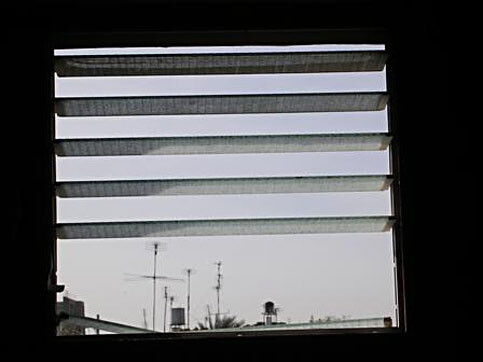
A Rafah family’s bathroom window with glass slats broken to allow for an Israeli sniper to fire through. Life in Rafah is a nightmare of Israeli incursions, sniper shooting, and property demolition. (ISM Rafah)
Ya’gheib, lay ma’tissel ala hababak ila habunik. (“Oh you absent, why don’t you call your friends who love you?”)
George Wassouf fills our apartment walls whenever Imad is on the computer engaged in an online conversation with people he will not meet face to face. There are dozens of virtual dramas going on every night in the Internet cafes between the young Rafah men and their dreams of the outside world. In Rafah, dreams are far away and span the world while bodies sit at home, between walls and Walls.
Young men and women out of high school have one of two options: pursue their degree, or get married. For men there is a third option — be lucky enough to connect your way to someone who is high up enough in one of the Palestinian factions to be bribed to find you one of the few jobs that exist, and magically you will be transported into the 15% of people who have found work here.
If your family does have the money to buy you a degree, this will likely prove worthless without the third option, and your life pursuit will be found in sitting long useless hours in unemployment offices, which are the connection pools to the work bribes, the real bureaucracy facing the average Rafah citizen.
There is no work for over 5,000 shebab (“young men”) with degrees here in Rafah due to the closure of the Gaza Strip and the constant demolition of its factories, and the shebab drown in their boredom, drown in the soft floor mattresses to a background hum of the latest deaths repeated on Al-Jazeera, and drown in the dreams of the Internet for 2 shekels an hour. They drown in the streets walking back and forth with no destination, the heavy rhythm of their feet on the pavement, pockets bulging with handfuls of watermelon seeds, chewing on them like they chew on their thoughts of flying elsewhere, anywhere but here, this last dark corner of earth. This is the life of shebab here in Rafah.
This is the zahag. “Zahag”, an Arabic word for this long, heavy boredom that feels like a slow death. I am zahaganah. He is zahagan. We live in the depths of our zahag, the marks of our heavy bottoms memorizing the couch cushions. We stare at each other over endless cups of tea, through the cigarette smoke, filling the emptiness with words.
In the West, people fill their emptiness with endless work hours, sojourns to new horizons, coffee shops and night clubs and restaurants, the limitless consumerism wrapped in shiny paper and flashing lights. Here in Rafah, the cinema was destroyed in the First Intifada when it was thought inappropriate to enjoy oneself in empty entertainment when people were being arrested and killed.
In the same way, weddings went music-less — then and also during most of this Intifada, except during the hudna (“cease-fire”) this summer — either out of respect for the dead or fear the army might hear and come raid the celebration. My friend Nahed was married in the First Intifada, simply, with a crowd watching in silence, and then moved unceremoniously to her husband’s house to start her honeymoon. The next neighborhood over was under curfew, this time for days, which left her wedding full of empty chairs for all those who could not leave their homes.
In the present, the wind is blowing strong enough to open the bottoms of the women’s long jilbabs, and for those who wear the niqab, it threatens to reveal their veiled faces. In the morning I woke up to the moans of Im Ahmed crawling back into bed after seeing her youngest daughter off to school, “Cold, cold, cold” Schools open early here, 7am, to make room for two shifts of students.
The classrooms are packed to make room for the dense population of children in Rafah — fifty to a room for four hours in the morning leave to make room for fifty more in the afternoon, and the teachers struggle to siphon the understanding of textbook pages into edible bites. This week is exam week and everyone in grade school is studying everything they missed or misunderstood all evening. Educational success is everything here. Especially for the seniors — their ability to get partial funding for their university studies depends on their final scores. 96% and over means you can study medicine. 91% to be an engineer. 85% to be a pharmacist.
And after the diploma, if you’re lucky enough to be a woman here, you can fill up your day with housework since there are no jobs. If you are a man and you graduate, you spend your jobless days in living death. My friend Mahmood tells me about his first year after he graduated from a university in Bangladesh with a degree in electrical engineering. “I would sleep all day, waking up to glance at the news on TV or to eat something, and then at night I went out to smoke shisha (a waterpipe with flavored tobacco) with my friends. I don’t believe I thought about anything that year. It was like being in a coma.”
In the boredom of closure, under the weight of pain, we grew thick grey calluses over the areas of our hearts that knew how to be sensitive and appalled, and we became slower to feel the individual crimes of the army, like an old woman adding one more orange to the massive bag of oranges she was carrying on her head.
After the week-long October invasion, people became harder to shock. A two-day incursion into Block O yielded only matter-of-fact headlines in a font only slightly larger than the fine print. “Oh yeah, don’t you know, the army is still in Block O.” I remember something I read once about torture, that the victims of torture, over time, first become accustomed to the violence and then become dependent on the violence as the only thing to take them away from the slower death of the days of boredom. I remember two days after the Hay es Salaam incursion last week, sitting with Mahmood on the roof at night, listening to what he thought were resistance fighters laying land mines in our street right outside.
“If they are laying land mines this far into town,” he said, “then there is something really serious coming. If not tonight, tomorrow.”
And I remember on that day, when I was feeling so sick from the situation that I could not feel the individual sickness of the Hay es Salaam invasion, how ashamed I felt when I felt a momentary small joy pass through my stomach. Joy, not for the violence, but for the thing that would take us away momentarily from the routine of the days.
In all of this there is music for comfort, the rhythms giant and melodramatic as the bottom of the sea, pronouncing soft crooning echoes of desires whispered in the wordless capsule of the heart.
“I miss your eyes.”
“My mother, my mother, you see them bury me in the dead ground.”
It touches a dead part of our heart and scrubs away at the calluses to find the place where we still desire things, the place where we are still surprised by the world, where we are still unprepared for the worst. And even if we are heavy and silent in the stale cold of the office’s cradle, some small corner dances inside. You can see it in the long stare of Imad listening to George Wassouf and typing on Instant Messenger to friends he has met only by pen.
So the beginning of this was the zahag and it ate up our hearts and our eyes and the part of us that made us human. The army invaded the border of Brazil for two days: curfew, house-to-house raids and arrests. And then it moved just south to Hay es Salaam and invaded five-hundred meters into town, to the cemetery, the new cemetery built to accommodate the number of shaheeds in this Intifada, already half-full.
Mahmood paced up and down the office floor knowing a tank was parked three meters from the freshly dug grave of his grandmother. Then the army pulled out, leaving 6 dead and one old woman in a coma; 13 more in the hospital with less serious injuries; nine homes destroyed and one man arrested. I have been here nine months now and I have become almost as unshockable as those who have spent their lives here. I went from home to home of the newly buried martyrs and listened to their stories without blinking.
There were the old women with their eyes bleeding from the weight of the years, hands holding up the sky’s weight above their heads, calling ya’rab, (“my God”). The daughters, the sisters, breaking under the weight of pride, holding it under their grief like the whole world of earth and water hovering just over their heads, just low enough to touch. There were the widows, oh God the widows, silent and blank eyed.
Impossible to discern their thoughts, I let my imagination wander. Was it unbelievable grief that was being cloaked in expressionlessness or was it fear for the future? Was it a fiery love lost or a stable economic support? The widows lean against the wall expressionless. Nursing a child, maybe. A few months pregnant, maybe.
I search their eyes. They are the same tired eyes so many brides wear to their weddings, exhausted after an entire day at the coiffeur’s; taken aback by the hundreds of people watching her and a stranger sitting next to her, about to become her life partner. It’s the same expression but there is more wear. And I imagine anger at me, a stranger coming to gawk at the disarray and leave.
This time when I went around it was more natural than ever to go and sit with the women, maybe I’ve seen enough grief to fit in a little?
Imar Mehsan
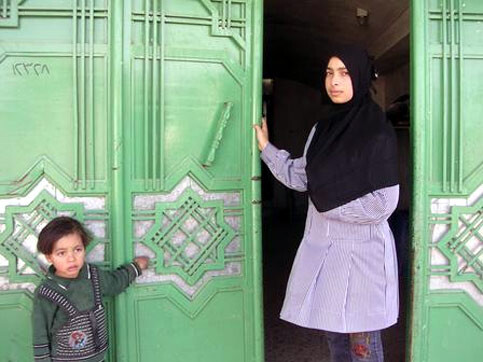
Ahmed Ziadi’s two children, Mohammed and Alaa, standing next to the front door of their home, broken open by the Israeli army. (ISM Rafah)
There was Alaa, the nineteen-year-old widow of Imar Mehsan. She greeted us with the grace of an angel, her clear face shining softly as a young moon, green eyes intense.
“He spent his life in the mosque. He never touched a weapon and he wasn’t a sheikh, he was just very religious. I used to ask him, ‘where are you going?’ Always the same answer, ‘To the mosque.’ ‘Where are you coming from?’ ‘From the mosque.’
“We had been married for three months when he was killed. We married on the twelfth of September and he died on the eleventh of December. He was 22-years-old. It was 7am when they killed him. He was fasting that day.”
Alaa leafs through wedding photographs until she finds the one she wants. It shows her and Imar on their wedding day, holding an open Qur’an between their hands. “We read Qur’an on our wedding night. How many people do that? But we did, we really did, we read Qur’an on that night and every night until he was martyred.”
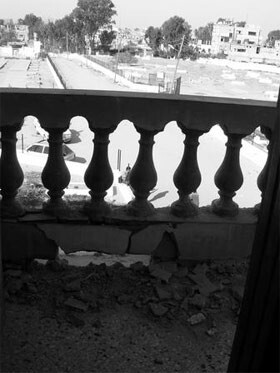
The Israeli army knocked holes in this Palestinian family home’s balcony to use it as a sniper position above the road beyond. Three people were killed by shots fired from this position. (ISM Rafah)
Imar went outside to go to mosque and on the way he saw two bodies unmoving on the ground by the cemetery. He didn’t notice the army was holding a sniper position in the building across the way. He went to help them and the army’s snipers shot him from the home they were occupying.
Alaa is smiling through a tearless face. “I’m not upset about this because I know my husband is in Paradise. Everyone here wants to be martyred. My husband wanted to be martyred so he could go to Paradise. We are so bored and depressed from this situation that everyone wants to die. There are martyrs in every part of Rafah.”
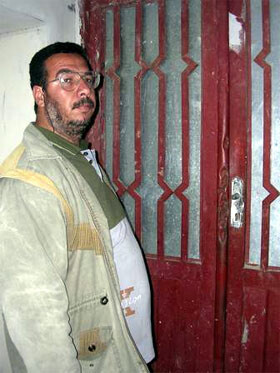
Ahmed Ziadi, owner of the home, stands next to a door made unusable by the invading Israeli soldiers. (ISM Rafah)
At 3:30am the army entered Hay es Salaam with more than 20 tanks, and these they parked next to the Rafah Cemetery. They surrounded Ziadi’s home with military jeeps and drove one of them through his front door. “In less than one minute, a large number of soldiers entered the house. I was on my way downstairs to open the door for them (so they wouldn’t destroy our door to enter) so I was standing on the stairs when they entered. I could count them. They numbered forty-two.
“A few soldiers among them were screaming in Arabic, ‘Put your hands up,’ and ‘Get downstairs.’ With them was one trained dog. We evacuated our flat upstairs and sat on the first floor. They started searching the house and they took sniper positions. While evacuating the upper levels of our house, we could see them breaking holes in the balcony wall and hear them breaking things.”
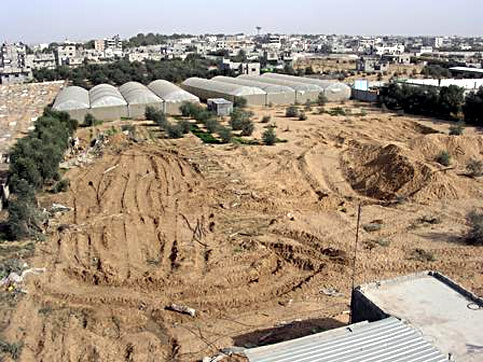
The demolished land, on the other side of the family’s home, used to be a farm. (ISM Rafah)
The incursion lasted the morning — 3:30am until 9:30am — during which the family was guarded with six soldiers and the dog. They destroyed greenhouses belonging to the Qeshta family one one side of their home and they destroyed several homes to the other side. And they didn’t leave Ahmed Ziadi’s home without stealing his and his wife’s ID cards, a golden necklace from their wedding, and two cell phones.
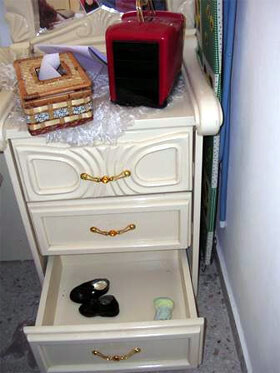
Empty drawers from which the Israeli army stole money, Fatima’s marriage jewellery, and three cell phones. (ISM Rafah)
Eyad Mohammed al-Hamoud
Fatima is the 25-year-old daughter of Eyad Mohammed al-Hamoud. She welcomes us into the bare hut of thin wood walls and a thinner corrugated iron roof. We are in the countryside, far enough from the city that the room is empty of visitors, a much longer drive than most people are willing to make.
Fatima moves heavily her tall, long bones and her large eyes. She is so glad to meet us, she has heard of us. We crowd on thin mattresses as her sister and aunt struggle to hang a light bulb on the end of a cord to light the dusk, the only electrical connection in the house. Fatima speaks, her voice a steady toe pressed against a thin tightwire threatening to break.
“What can we say? The shehada (the core Muslim affirmation: “There is no god but God and Mohammed is his messenger”) — the shehada means the shehada. What can we say more than that?
“They took our land, Jerusalem. Inshalla (“If God wills”) in Jerusalem, my God. My father is a shaheed, (“martyr”) what can we do?
“They were shooting so much all the time, and we can’t go out to the olive trees. What can we do? Sit here in this room.
“You can see the bullet holes in the roof. The tanks park far away but their bullets reach our roof. What can we do? Where can we go?
“He was sitting with his sister and his family, and he said, ‘It’s a lot of shooting.’
“A bullet entered his back and came out through his stomach, he fell on his pillow. We didn’t hear. We were preparing dinner and then found him injured. We looked for a car but it is hard to find in these parts. He died in the car. What can we say? Ya’rab.
“I though my father might want something so I went to see and found him injured. They’ve made our home like a necklace, full of holes.
“He was fifty-five years old and had five daughters and 2 sons. None of us are married. We harvest olives and work the land.
“The land is belonging to another family, there is no work now that my father is dead. What can we do, where go?
“We stay here to help our father with the land. He gets up, we get up with him, harvest the olives, work this land. Now what can we do?
“What can I do? I’m a girl, can I work the land by myself?”
Mohammed al-Akhras
A week before Mohammed al-Akhras was killed at the age of 16, his cousin Jihad al-Akhras was shot dead by the army at the age of 17 while working as a bag handler at Maabar Rafah (Rafah Crossing Point, the only way for Gazans to travel internationally).
The army shot him at 6pm and then prevented the ambulance from retrieving him, guarding his mangled body until the next morning, when they threatened to shoot at the crowds and the old women who came to retrieve his body, then took him into a tank for “scanning” before finally handing him over to the ambulance. Mohammed had been planning to buy new pajamas for the cold winter nights, but decided to wait the traditional mourning period and buy pajamas the next Saturday.
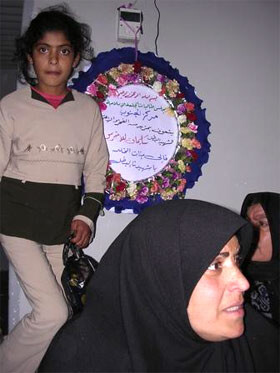
Fatima, the aunt of Mohammed Al-Akhras, a 16-year-old killed by the Israeli army. (ISM Rafah)
That Saturday he went to school and then returned with his sister and his cousin. His sister is ill now, alone in bed, not receiving guests. She is the last family member who saw her brother alive.
“Our neighbors lost a son. Their twelve-year-old son was playing soccer near the border and the tower shot him dead. To play soccer in safety is less than even his human right. Our children’s lives have become like nothing.”
Mohammed’s uncle added, adamantly and in English, “We haven’t a factory to create children. We are suffering. We are living our lives to raise our children.”
His aunt continued. “He went to the funeral march — he always went to funeral marches to honor the dead. The army shot him from the tower at the edge of town half a kilometer away. You see, there is no safe place in Rafah. They shot him in the leg.”
The people took him to the hospital. His father works in the hospital and didn’t expect to see his own son since the army was attacking Hay es Salaam and his family lives in Yibneh. All the injured were coming from there and he didn’t recognize his own son when he was admitted to the hospital.
“We speak our truth and we speak our revelation so the world will see and hear about my sixteen-year-old boy. He was coming back from school, he hadn’t even eaten yet that day. He changed his clothes, went out and saw what the army had done.
In the next month, Mohammed had planned to apply for a new ID card, a sign of passing into adulthood.
“With all this, we the Palestinian people say al-hamdoulallah (“Praise be to God”). In the face of shooting, and demolition, and terror, and arrest, and seige, we say, Allahu akbar (“God is greater”).”
Mohammed Zeibu
Mohammed Zeibu, martyred at the age of 26, was deeply rooted in his community and he loved his wife, Wisam.
His mother had died in the beginning of this Intifada, naturally, of cancer, and then a year later his brother was killed by the army. A month later, his father died of grief and he decided he wanted to make a new family to build something while everything else was crumbling around him, so he moved up his wedding a year. That was four months and ten days ago. Wisam is married, two months pregnant, and widowed in the space of four months.
The morning of his death he prayed the morning prayer and preferred an apple to a sandwich for breakfast. The house was sandwiched between tanks and his wife’s mother slept in her father’s house. He left for work in a hurry. “Take care of yourself.”
Zeibu worked in al-Najjar Hospital, as a nurse administrator. He was shot three times while working in an ambulance on its way to pick up the injured in a zone under curfew.
Wisam’s siblings heard but told her nothing. To her mother, they told her over the phone her son-in-law, who had become as her own son, had been shot in the leg. She found out the truth on the TV’s latest news, and when the noon news came on she called her daughter to come see. “I couldn’t bear to tell her myself what had happened.”
“We are in our land and we are okay. We can live on tea, bread, and zatar, for a month. We don’t need fancy things.”
Mohammed Zeibu leaves behind a widow, 8 brothers and 4 sisters.
Nasser al-Deen
Thursday morning, five am. Nasser al-Deen prays and then asks his mother, “What is that noise?”
He listens longer. “It’s nothing.” He goes out to see the shebab and comes back with news of the incursion. “I want to go out and see.”
His mother, Im Nasser, looks at him, know what he means. Her eyes weigh heavily into her face and her cheeks fold like soft sighs on the overlook to time past. “Don’t go. You’re my son.”
“I want to go become a martyr. Do you agree?” He takes her face in his hands and kisses her cheeks. He looks into her eyes. “Mother, you are my conscience.”
But she knows the meaning of the words, uttered time and time at the dinner table and muttered over the soft rhythm of evening conversations. The wind is its own body. There is nothing to fill the long zahag of her listless son as he turns the same streets under his feet again and again, finding them unchanged and lost under his lost feet. There is no food to fill the wide malnourished eyes of his own children or the pit in his stomach and there is nothing to fill the blankness of his own stare when he looks towards tomorrow, or when he angles himself towards the past to peer down its long grey road, all the events beyond his control that have brought him here.
She knows the Kalashnikov he carries can do no more against the army than a child’s rock, and that using it is defense in symbolism only, and that its real purpose was to bring honor to a death already written into his years, like the funeral procession carrying his body to the cemetery, and the gunfire ringing like the sound of anguished hearts, his friends shouting Allahu akbar as they carry his shrouded body to the earth while his soul rises up to its promised place in the Paradise.
She turns away from her thoughts and touches her oldest son on his shoulder. “My heart is accepting of everything you do, and so is Allah.”
He runs outside and after a bit she runs after him, doubting herself. She doesn’t see him and turns back. Outside is invasion. She finds a car and rides to the souk (“market”), so she misses him when he comes back briefly, looking for her, and then goes back out again. In the middle of errands, a friend interrupts a conversation to note that there is a shaheed from the Abu Najjah family. Im Nasser stares back at her friend. “It’s my boy.”
She leaves the souk to look for her other son, to ask him if it’s true, but she doesn’t find him. She calls her relatives but no one admits to knowing. She says, “What, don’t you want to tell me?”
His brother’s son came to his funeral. He leaned his head against the wall and said to his father, ‘Father, don’t blame me for anything that may happen to me.” He meant he wanted to go martyr himself. He is four years old.
Now, three days later, Im Nasser looks joyful when she climbs above her grief. “My son is a shaheed. Al-hamdoulallah. Lailahailallah (“There is no god but God”). Allahu akbar.
“When they brought him to me, I told them, I want you to say, ‘Congratulations. Your son is a shaheed.’ Then they brought him in. He entered his father’s room. I caught him and smelled his burial shroud and said,
Allahu akbar.
Allahu akbar.
Allahu akbar.
Allahu akbar.
“Then I told the journalists I wanted to ride with them to the cemetery. They took me in their big car and we drove with the funeral procession. When my son’s body entered the cemetery, the crowd said, Allahu akbar.
“This is nothing. Inshallah (“If God wills”) we will all die with such honor.”
“He had nothing in this life but honor, faith, and love of the people. He used to work without taking money from people — he would refuse to take payment. Al-hamdoulallah, this loss comes from Allah.
“Why does Sharon make peace and then take it back? We are religious; we follow the religion of peace. In the end, Sharon will become a cornered mouse. He’ll have to leave the helicopters and the tanks and he won’t be able to move in the Gaza Strip. God is with the patient; we are patient. If he massacres, and if he hires collaborators, we will win. This is the holy land and this is a holy war.”
Nasser Abu Naja was 28-years-old when he was martyred and he left behind his aging mother and his wife Safa, 23-years-old and 7 months pregnant; 2 daughters and a son. He leaves without a shekel to his name.
Laura Gordon is a 20-year-old American Jew who came to Israel in December 2002 with the Birthright Israel program and proceeded, three months later, to begin work with the International Solidarity Movement in Rafah.





